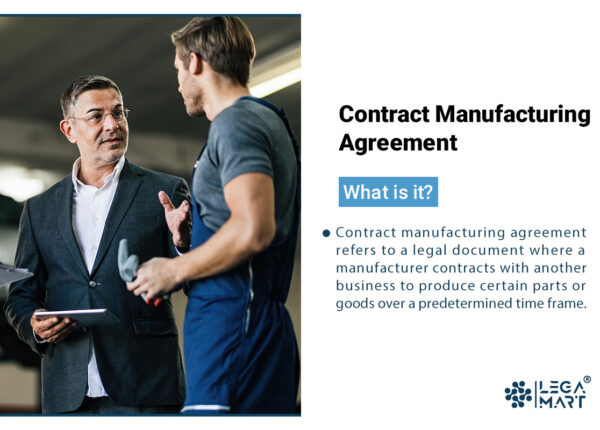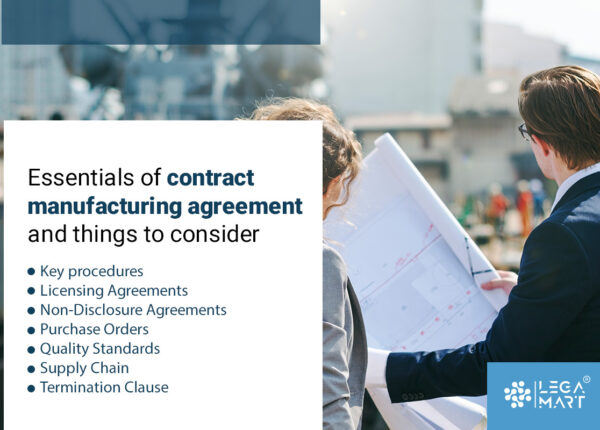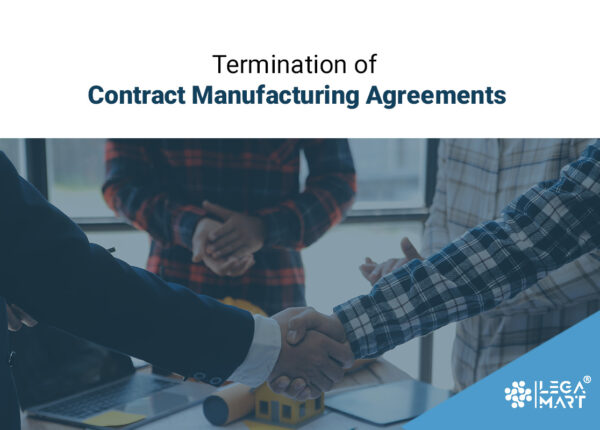Introduction
Despite how ideal it sounds, not every company or agency can produce everything in-house—especially in the manufacturing sector. Within the scope of Legal Practice & Specialization, purchasing tools, machinery, and knowledge can be expensive. These factors make drafting a contract manufacturing agreement a relatively widespread practice.
Contract manufacturing agreement: What is it?

Contract manufacturing agreement refers to a legal document where a manufacturer contracts with another business to produce certain parts or goods over a predetermined time frame. A contract manufacturer, regarded as a type of outsourcing, may enter into a business relationship with a company to produce parts, components, or entire products for the firm, following their requirements. The corporation then uses the manufactured goods in its production process or to finish its products.
Contract manufacturers are frequently autonomous companies specialising in subcontracting or marketing their goods to other businesses or government institutions.
The terms of the agreement specify the production costs, turnaround periods, quantities of work to be produced, services to be rendered, liability, and ownership rights for any intellectual property created. Contract manufacturing agreements also guarantee that both parties will carry out all their responsibilities, such as paying any fees stipulated in advance or receiving bulk discounts on purchases.
Non-exclusive contract manufacturing agreements are the most prevalent, and they generally make it simpler for businesses to identify partners eager to collaborate on projects.
Consider the scenario where you are the owner of a clothing manufacturer and want to increase your capacity for production. You could think about forming a partnership with a different clothing manufacturer that also needs greater capacity for their line of products. You would make certain products for one another through the contract manufacturing agreement, allowing both businesses to grow without investing in additional buildings or equipment.
Essentials of contract manufacturing agreement and things to consider

Contracts for manufacturing can vary greatly. You could sign a single contract for one particular product line or several contracts with multiple suppliers in one area. Whatever your particular requirements, you should draft a manufacturing contract that spells out the precise conditions of the arrangement between your business and one or more other businesses.
Any contract should address issues like:
- Intellectual property
- Project costs
- Responsibilities of all parties
- Liabilities of all parties
- Turnaround time
Manufacturing contracts must include specific provisions to be enforceable. Make sure your contract contains these clauses to safeguard all parties in the event of a dispute or failure to fulfil obligations.
- An offer of work
- Acceptance by all parties
- Intent to create a legal relationship
- Consideration, which is the transaction of currency and/or goods
In addition, depending on the company’s unique circumstances and the items they intend to produce, the majority of manufacturing contracts will include any or all of the following elements:
Key procedures: Terms for significant processes should be outlined in your manufacturing contract. It will be easier to guarantee that everyone is on the same level and pleased with the outcome if specified in the contract. Important techniques include:
- Delivery
- Invoicing
- Lead Time
- Payment
Licensing Agreements: If an entity anticipates its contract manufacturer to use branded intellectual property, this clause in the contract is crucial. This agreement is necessary for a third party to manufacture a product legally and to prevent trademark infringement litigation from being filed against them.
Non-Disclosure Agreements: If you are working with proprietary services or goods, a non-disclosure agreement, or NDA, is crucial. The IT industry is one where this happens frequently. To ensure they can surprise customers when they announce their newest items, Apple, for instance, would include an NDA in any contract with a third-party manufacturer.
Purchase Orders: These contracts lay forth the conditions of a deal between a company and its contract producers.
Quality Standards: Make sure you get high-quality services and goods if you are outsourcing the manufacturing for your company. As a result, the majority of manufacturing contracts have several clauses that specify quality requirements. In the long term, this will save you time and effort and lessen the likelihood that the buyer would receive a subpar product.
Supply Chain: The goods of your company most likely don’t start and end in the same location. You can specify a product’s supply chain in a manufacturing contract to increase productivity and communication. For instance, designing, marketing, packaging, and producing your products may require the assistance of several business partners.
Termination Clause: The manufacturing agreement will eventually come to an end. To avoid a problematic break-up between your company and its suppliers, the first contract should specify what happens to things like intellectual property and patents. Outlining the conditions under which the contract may be cancelled, such as bankruptcy or a violation of the agreement, is also helpful.
Advantages of using a contract manufacturing agreement

There are a few key reasons businesses could decide to establish a manufacturing contract. These agreements generally reduce costs, increase efficiency, and make it simpler to introduce new products to a market and ultimately gain widespread distribution. The following are the key advantages of using a manufacturing contract:
Cost Saving: If you work with a manufacturer who has already made the necessary equipment investments and is familiar with the manufacturing process, your business can save a lot of money. You would perhaps deal with a producer of products that are comparable but not direct competitors. Depending on where the manufacturer is located, you might also save money on the following:
- Energy Cost
- Labour Cost
- Overhead
- Raw Material
- Taxation Benefits
Distribution: Contract manufacturers may even transport your goods to every customer, or they may choose to drop-ship a product to clients in a particular region. Some manufacturers manage shipments for specific clients. Others may deliver the goods to a central warehouse, after which you, as the hiring firm, will be responsible for shipments.
Convenient Market Entry: Even if it could be challenging to break into the market where you manufacture your products, you can still produce them at a low cost and export them to surrounding nations which would be more challenging to reach if you produced your products elsewhere.
Core Competencies: You can free up employees at your own company to concentrate on their true talents, such as marketing or selling, by using a manufacturing contract. If so, your company might not be able to produce your product in a location or factory configuration that saves you money.
Risk of using a contract manufacturing agreement
Even while contract manufacturing agreement has its advantages, using another company to make your parts and products might present some challenges.
Limited Control: There are particular features and requirements that the hiring business wants in a product. Up until the product is given for review, the corporation has very little influence once those desires have been expressed. The client has very little influence over the product’s manufacturing and production. On the other hand, the contract manufacturer typically has little to no input into the product’s design. Although the contractor is permitted to offer suggestions, there is no assurance that they will be accepted.
Low-Quality Products: You run the risk of selecting the incorrect contractor if you contract with another business to make your items. Product quality usually suffers when this occurs. Miscommunication, corporate misalignment, or disagreements over the part or product’s design can all lead to low-quality products.
Low-quality items can have a negative effect on the client’s reputation for any number of reasons.
Job Displacement: One of the effects when a corporation switches from in-house manufacturing to outsourcing is firing the internal workforce. Employee relocation may result in additional problems and costs.
How to choose the right contract manufacturer?

You should constantly keep an eye out for a few key qualities in a contract manufacturer. Finding the correct combination can make a huge difference in a company’s profitability and reputation if you are aware of the risks and advantages of outsourcing.
Quality Facilities: A contract manufacturer’s facilities should be well-kept and managed when you visit them. The workforce should be knowledgeable and experienced, the machinery and equipment should all be maintained, and a planned, coordinated production method should be used.
ISO Certification: Ensure that any contract manufacturers you work with uphold ISO-certified manufacturing quality standards. The ISO 9001:2015 standard was created expressly to lay out the requirements for a business’ quality management system. Parts, components, and products from certified contractors are often of superior quality for their customers.
Communication: Any business agreement must have open lines of communication between the parties for it to be successful. More trustworthy contractors have more expertise in keeping in touch with their customers about the design, manufacture, and characteristics of the goods they were contracted to create. They can immediately respond to manufacturing demands with little resistance or lag time.
Market Awareness: Reputable contract manufacturers keep up with market trends and happenings. They react to market shifts and make adjustments as necessary. Companies feel comfortable investing in them because of their reputation built via their presence and activity in the sector.
Termination of Contract Manufacturing Agreements

The termination of contract manufacturing agreements is a multifaceted process that demands careful consideration of various factors. Parties must approach termination with a clear understanding of the agreed-upon methods, notice periods, and the legal implications of material breaches. The meticulous review of termination clauses is essential in guaranteeing a smooth and legally sound termination process, shielding the interests of both the manufacturer and the client in the complex realm of commercial agreements.
Termination by Mutual Agreement
The general approach to terminating contract manufacturing agreements involves mutual agreement between the manufacturer and the client. A formal termination agreement, executed in writing and endorsed by both parties, is imperative for legal validity. This agreement should expressly outline the effective termination date and any additional terms or obligations required to the termination process. This method fosters cooperation and mitigates the risk of disputes, ensuring a consensual end to the manufacturing relationship.
Termination with a Notice Period
Another popularly used method for termination is incorporating a notice period into the contract manufacturing agreement. This specified notice period gives both parties time to wind down operations, seek alternative manufacturing solutions, and fulfill any outstanding contractual obligations. The significance of a well-defined and mutually agreed-upon notice period cannot be overstated. Parties should be cautious about breaching this period, as it may lead to legal conflicts and financial penalties.
The notice period stipulated in the agreement is crucial. It should be reasonable, clearly defined, and agreed upon at the time of contract formation. Often, a notice period ranging from 30 to 90 days is considered standard, but this may vary based on the nature of the manufacturing arrangement andvarious other factors. Parties should be cautious about the consequences of breaching the notice period, as it may lead to legal disputes and financial penalties.
Termination due to a Material Breach
A more severe and legally compelling ground for termination is the occurrence of a material breach. A material breach involves a significant violation of the agreement’s terms that strikes at the core of the contract, affecting its fundamental purpose. Examples include delays in product delivery, substandard quality, or non-compliance with safety standards. The non-breaching party is typically entitled to terminate the agreement, contingent upon following the outlined process, including providing a formal notice of breach and allowing a reasonable period for rectification.
Reviewing Termination Clauses
To effectively navigate the termination of a contract manufacturing agreement, parties involved should meticulously review the termination clauses within the agreement. These clauses serve as the foundation for termination, dictating the methods, conditions, and consequences. Key provisions to review include:
- Termination Methods: Clearly outlined permissible methods for termination, including mutual agreement, notice periods, and termination due to material breach.
- Notice Period: Specification of notice period length, methods of notice, and remedies or penalties for breach.
- Material Breach: Definition of what constitutes a material breach and the process for addressing and remedying such breaches, outlining the rights and responsibilities of each party.
- Consequences of Termination: Addressing the disposition of assets, inventory, and ongoing contractual obligations post-termination.
- Dispute Resolution: Outlining mechanisms for resolving disputes related to termination, such as arbitration or litigation.
Conclusion
If you intend to deal with a contract manufacturer, it is crucial to have a written agreement in place. A written contract will shield you from any dishonest action. Without a solid contract, the manufacturer might modify your product and sell it if they notice a market need for it. A contract outlines your legal rights and available remedies if the manufacturer violates the agreement. If you bargain with foreign manufacturers, you’ll need to understand which nation will be in charge of your deal.
You should engage with an expert lawyer to develop and implement your manufacturing contract since a strong contractual agreement will shield you and your company from these possible concerns.
LegaMart is a global legal platform designed to connect individuals, startups, and businesses with qualified lawyers across jurisdictions. With a mission to simplify cross-border legal services, LegaMart provides users with access to a diverse network of vetted legal professionals who specialize in areas such as international law, corporate law, immigration, dispute resolution, and more.
By leveraging technology and user-friendly tools, LegaMart allows clients to search for lawyers by country, language, or legal expertise, submit their legal queries, and receive tailored legal solutions in a streamlined, efficient manner. The platform serves as a bridge between legal professionals and clients who need multilingual, multi-jurisdictional support — especially in today’s increasingly globalized legal landscape.
Whether you’re an entrepreneur launching a business abroad, an individual dealing with immigration paperwork, or a company navigating cross-border compliance, LegaMart aims to make legal help more accessible, transparent, and collaborative.




